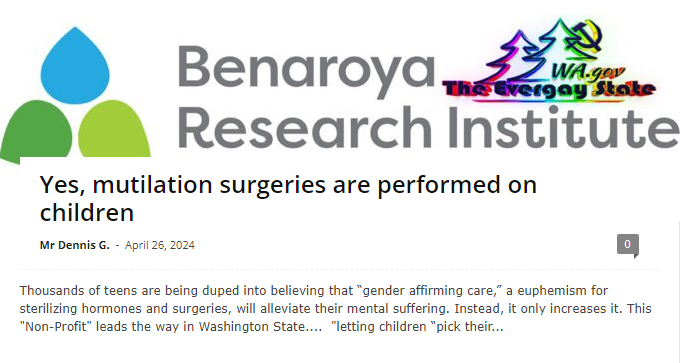Washington States priorities are to Mutilate Children,
No further jail time for Washington man found with 13-year-old missing from Michigan
Most of the country has swerved to the political right, but Washington state has steered left — and nobody knows what exactly is going to happen next.
That was the new reality the Puget Sound region woke up to Wednesday as a cold November sun climbed above the slate-blue Cascades.
Republican Donald Trump is the U.S. president elect, Democrat Bob Ferguson is Washington’s governor-elect and several statewide ballot measures backed by conservatives are history.
Trump and Ferguson may clash in the years to come over policies regarding immigration, civil rights, federal funding and social services. The outcomes of such clashes could shape life here for millions, including voters who shared their views as Seattle Times reporters fanned out across the region Wednesday.
On Capitol Hill, a progressive parent worried about what another Trump presidency could mean for his kids and their friends.
Outside a Pierce County bar, a plumber called his Trump vote a dice roll that he thinks may bring prosperity to his kitchen table, while a Puyallup shopper said he thought Trump would put “more money in my pocket.”
In a small Snohomish County shop, a disillusioned Democrat explained how the Israel-Hamas war helped drive him to support a third-party candidate.
And in downtown Seattle, Gov. Jay Inslee celebrated a slew of statewide wins for blue candidates and causes, calling Washington’s next Democratic leaders —
Ferguson and Attorney General-elect Nick Brown — “the best duo to defend” against Trump’s hard-right plans.
Surveying the national and state election results, the outgoing governor said they could provide “a light of inspiration” to liberal people nationwide. Washington law protects abortion access, among other liberal priorities.
“People do fear for themselves and their families,” Inslee said. “What we’re doing today is to say, ‘We have erected substantial protections for them.'”
These were some hopes and fears rolling across the Pacific Northwest’s most populous region in the wake of an election that will give Washington a new governor, a new attorney general, new congresspeople, a new U.S. president and a clear path to capping greenhouse gas polluters and taxing capital gains.
 Liberal fears
Liberal fears
Democrats absolutely dominated Washington’s statewide elections Tuesday, leading in one race, declaring victory in all the rest and extending a longest-in-the-nation gubernatorial streak that began in 1984.
Seattle will send a democratic socialist to the Legislature, with Shaun Scott winning a state House spot, and is sending a message to the City Council, with progressive Alexis Mercedes Rinck poised to win a citywide seat.
And yet, many left-lane voters spent Wednesday in a state of despair because of the results on the national level, where Trump bulldozed Vice President Kamala Harris and the GOP conquered the U.S. Senate.
“I feel like hell,” said Chris Patterson, wiping away tears during a walk through Cal Anderson Park with his poodle, Jack. “I worry for my kids. I don’t feel like I recognize the country they’re growing up in.”
Patterson, 53, said he fears especially for his 18-year-old son, who is gay and headed to the University of Washington. The dad now wishes he had encouraged his son to go to college in Canada. He thinks Trump may “make an example out of” progressive cities like Seattle by sending federal troops to enforce right-wing policies, like immigration bans.
Alarm bells are ringing at the Northwest Immigrant Rights Project, which waged multiple battles against Trump during the Republican’s first term, including over his “Muslim ban” on immigrants from certain countries.
“He’s repeatedly bragged about the huge mass deportation effort he would engage in,” legal director Matt Adams said.
While the logistics of actually doing that on Day One might be a roadblock, the next White House will surely try something immediately, Adams said.
Undocumented immigrants here may be less vulnerable to mass raids than in other states, based on a 2019 law that restricts local police from getting involved in immigration enforcement, he noted. But immigration is a policy area where the president wields a lot of direct power, he said
“We’ve got to be ready” to file lawsuits, Adams said.
Local advocates for transit and homeless services expressed similar anxieties, calling on state and city leaders to “step up” if Trump Republicans make good on promises to slash spending by the federal government.
“We have to have as much in place as possible to protect our neighbors and ourselves,” said Alison Eisinger, executive director of the Seattle/King County Coalition on Homelessness.
Down in Tacoma, Demond Louis described a family group chat overflowing with emotion Wednesday morning. Louis, 41, who is black and has three daughters, said he voted for Harris because of her strong stance on protecting reproductive health care and marginalized people.
“Everybody I think is just processing the information,” he said. “There’s definitely a feeling that we may be in for some tougher times.”
Conservative hopes
Sure, the GOP’s losses in Washington races stung, said Snohomish County Councilmember Nate Nehring, a Republican. But those were expected, considering Democrats’ momentum here and all the money they spent.
Nehring went to bed Tuesday night feeling positive, anyway, he said, because Trump and other conservatives won so many national races in purple states.
“There was more to be hopeful about,” Nehring said.
It was astounding how Trump gained ground over 2020 nearly everywhere else, including liberal bastions like California, said Matthew Patrick Thomas, who chairs the King County Republican Party. Washington was an exception.
“That’s a very telling thing about Washington and how blue we are,” he said.
Thomas pushed back against panicked predictions by Democrats and some national media that a second presidency will allow Trump unchecked and authoritarian power.
“There is the rule of law and regulations that he will abide by,” he said. “Americans are not buying the false narrative the media is putting out.”
Americans like Ottis Farris of Auburn, who voted for Trump for a third time this year, after supporting
Democrats Bill Clinton and Barack Obama before.
“The question being put out to everybody is, ‘Are you better off now than you were four years ago?’ And we absolutely are not,” he said, blaming President Joe Biden and Harris for inflation outside a bar in Milton. “I’m going to roll the dice and see what four years bring me.”
Farris, 57, doesn’t want to see Trump deport all immigrant workers but would like to see tighter restrictions on border crossings.
“I work with a lot of amigos, a lot of Mexican workers. They work so hard, they are so great,” he said. “I don’t want to see the president get rid of all these people. We can close the borders, there’s enough here.”
Shopping at a Puyallup mall, Trump voter Eric Kim likewise cited inflation, saying prices “weren’t as super high” before Biden and Harris took over. The 41-year-old was also swayed by cultural issues, he said, mentioning concerns about transgender athletes in sports and LGBTQ+ books in schools.
To pick a candidate, Kim considered, “Which one’s going to give me more money in my pocket at the end of the year, which one’s going to keep my kids safe if she’s doing sports,” he said.
New faces
Meanwhile, remarks by a couple of congresspeople Wednesday reflected Washington’s split-screen partisan reactions to the election results.
The state will send at least two new representatives to the U.S. House: Democrat Emily Randall and Republican Michael Baumgartner.
Randall, a Latina state senator from Bremerton who will be the first openly LGBTQ+ person to serve Washington in Congress, said she was grateful for her win but deeply worried about the national shellacking for Democrats.
Like many Democratic women, Randall said she got involved in politics in response to Trump’s surprise victory in 2016. Now she’s headed to Washington, D.C., with Trump set to return to the White House. Republicans have wrested control of the Senate and could also take the House.
“We saw under Trump’s first administration really scary attacks and increased rhetoric against people of color and LGBTQ folks. Not just words but policies that made life harder,” said Randall, stepping into a 6th Congressional District seat made vacant by the retirement of Democratic Rep. Derek Kilmer.
Baumgartner, a former state senator and Spokane County treasurer elected in Eastern Washington’s solidly Republican 5th Congressional District, gave Tuesday’s election a much more positive spin. Some saw Trump’s 2016 win as a fluke, whereas this GOP showing is overwhelming, he said.
“What the American people were saying last night is there absolutely is a mandate on the border and border security,” Baumgartner said. “They are fed up with folks abusing the generosity of the American people.”
New reality
First-time presidential voter Elizabeth Evore backed Harris, not because the 20-year-old from Snohomish was enthusiastic about the Democrat but instead because “whether you like it or not, we have a two-party system,” she said.
It’s a system Cameron Murphy no longer really believes in, he said in Snohomish, having supported socialist Claudia De la Cruz for president after viewing photos of atrocities by Israel in Gaza, backed by Biden and Harris.
“Both parties are bought out by billionaires,” Murphy said.
Neither Evore nor Murphy was particularly surprised to see Harris lose. But back on Capitol Hill, progressive Chris Schiefer was still in shock.
“It’s not really set in yet,” said Schiefer, 28, the morning after watching the election results on TV with his girlfriend. “At some point, I’m going to have to accept this reality, but at the moment, I’m still protesting.”



 Washington States priorities are to Mutilate Children,
Washington States priorities are to Mutilate Children,
